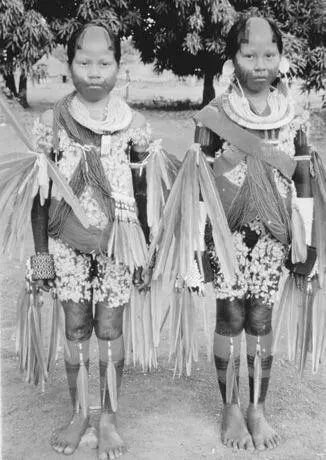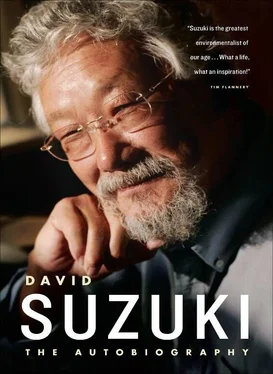That night I lay in my hammock, listening to the steady thrum of insects and the chirps of frogs from the surrounding forest, the gentle snores and breathing of Paiakan's family all around me. I felt so far away from anything I knew. This was the realization of dreams I had held for forty years.
It had still been warm when we crawled into the hammocks, so I'd stretched out the thin sleeping bag I brought and lay on top of it. I fell asleep but woke up surprised to be shivering. The night had cooled right down, and I was so grateful to climb into the bag for the rest of the night.
The next morning, using sign language and gestures honed from playing charades, I found the latrine. It was a narrow, open pit that one straddled, partially hidden behind a woven screen. If you ever find yourself in a similar situation, don't look into the open pit — the image of a mass of writhing maggots will sear your brain.
That morning we ate rice and beans, and a fish someone had dropped off. Here in as remote a part of the Amazon as you could find, the impact of contact was obvious, from the shorts, T-shirts, and flipflops to pots, knives, and fishhooks. Paiakan's hut contained the detritus of his trips to the outside world — plastic toys and his video camera. Still, this was as self-sufficient a way of life as one can imagine. A fractured limb, infected cut, or illness would have to be treated according to traditional knowledge and the medical skills available in the village. Without refrigeration, food had to be gathered daily; but that was a satisfying activity, and the food was fresh and chemical free.
It was frustrating to be so isolated by the barrier of language. Hand signals and smiles transmit only the most basic of information. I love charades as a game, but not as a way of life. I couldn't even ask important questions like “How is the fishing?” or “Are there jaguars?” I was happy finally to hear a plane in the distance. Now one of the arrival committee, I scampered along with the other villagers to the airstrip and welcomed the crew.
After the CBC gang arrived, I had to write and memorize a couple of stand-ups while Juneia arranged for the Kaiapo women to perform a dance sequence in the clearing. It was a spectacular sight as the women, naked and painted from head to foot, chanted and danced in unison. At one point I looked over at Paiakan and realized he was directing them with hand signals. We interviewed Paiakan on-camera, asking him why he had moved his people here and what the forest meant to him, as Juneia translated his Portuguese for us. He was eloquent, and it was a very productive shoot.
Then Paiakan sat down with Juneia to talk to me about his plans to fight the dams. He asked me for help in raising money to take different tribe members to Altamira and to build the traditional village on the dam site. I had no choice but to promise I'd do the best I could. But if I were to raise funds, I realized a key question was: would he be willing to come to Canada himself? His presence would make all the difference. Si: he would come.
Soon we were on our way out of the village, crossing a sea of green that extended as far as we could see on both sides of the plane. I vowed I would return for a longer stay. After nearly an hour, we began to see thin wisps of smoke, clearings, and huts and eventually landed near Redenção, the nearest settlement, which would have taken thirteen days to reach if we had canoed.
As soon as I could, I phoned Tara. She says I had a catch in my throat as I related the threats to the forest. “You have to do something!” I told her. When she asked what, I told her about the Kaiapo and their charismatic leader, describing Paiakan's plan, his need for funds, and his promise to come to Canada to help raise money and the profile of the issues.

Kaiapo girls in Aucre before a festa
As I continued on my way for the remaining five weeks of the shoot, Tara sprang into action in Canada, organizing events in Toronto and Ottawa. In 1988, the Amazon was a hot topic. The scale of its destruction was on everyone's lips. With luck, Paiakan's visit would fuel public and press interest.
People were quick to lend a hand. In Toronto, Monte Hummel and the World Wildlife Fund offered support for a fund-raising event, and in Ottawa, Elizabeth May, who was now with the Sierra Club and had first rocketed into prominence fighting logging in Cape Breton, promised the same. Soon great plans were afoot.
The Amazon rain forest is immense. Although the ecosystem has been assaulted for decades by gold miners, loggers, peasants, and ranchers, most of it remains intact. As roads increase, however, at some point the integrity of the forest may become so diminished that it will no longer support its biodiversity.
On our shoot, we visited immense coal-mining operations where huge holes appeared in the forest. We visited the Balbina dam, which had flooded eight hundred square miles of forest and driven two tribes close to extinction, drowning untold numbers of animals and plants, yet silted up so rapidly that it was soon abandoned. A road through the forest is the greatest threat because it brings with it a flood of the landless poor, desperate to make a living and willing to destroy the forest to gain it. We interviewed representatives of the World Bank and the Inter-American Development Bank, who justified the need for roads to carry economic development into remote parts of Brazil.
After I left Brazil to return to Canada, our crew remained to interview Chico Mendes, the charismatic rubber tapper who had galvanized his cohorts to fight to protect the forest. Two weeks after we interviewed him, he was murdered. During the 1980s, over a thousand activists, including Mendes, Indians, and many Catholic priests, had been murdered in Brazil with impunity. But the murder of Chico Mendes backfired. In death, Mendes's fame grew: he became a martyr, a worldwide symbol of the consequences of corruption underlying the destruction of the Amazon.
ON OCTOBER 14, 1988, Paiakan and Kube-i were to be tried for their visit to Washington. I flew down to Belém to witness the trial. The courthouse was ringed with young soldiers armed with rifles, pistols, shields, bulletproof vests, and clubs. Buses rolled up and out stepped hundreds of Kaiapo warriors in feathers and paint, carrying sticks, clubs, and bows and arrows. These men lined up in rows six abreast and advanced on the courthouse, beating the sticks rhythmically, marching in unison to their chants and periodic grunts. When they reached the soldiers, they lined up. Each warrior faced a soldier, menacingly staring him in the eye. The soldiers looked straight ahead, but if I had been one of them, I would have wet my pants.
Paiakan and Kube-i then gave speeches outside the courthouse, as the warriors gathered round them and sat down. An old Kaiapo woman began to scream at the warriors. Darrell Posey translated some of what she said: “I call upon you to take up arms, to kill the whites, slaughter them! I'm coming here to speak to you, to call upon you in the name of your mothers and your fathers, all of us older people. I'm calling upon you! I throw my words in your faces. Have I come in vain? You sit here while the whites are crushing us.” The men sat there with their heads bowed. The same woman then turned to the soldiers ringing the courthouse and told them: “I am here to speak my anger at you! I am enraged with you. You sit there drawing maps of our land to steal it. But I tell you, we're going to beat you soundly in defence of our land!” Kaiapo women are truly ferocious.
Paiakan and Kube-i mounted the steps to enter the courthouse but were blocked for being “seminude.” The judge ruled that they must dress to show respect for Brazilian law. When Kubei-i replied that they were dressed in respectful traditional attire, which gave them power, the judge said they must follow Brazilian formalities and should strive to become Brazilians. Darrell Posey muttered to me, “That would be genocide.”
Читать дальше



![David Jagusson - Devot & Anal [Hardcore BDSM]](/books/485905/david-jagusson-devot-anal-hardcore-bdsm-thumb.webp)









